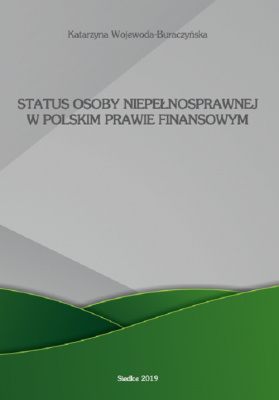The status of a person with disability int the Polish financial law
Keywords:
disabled person, finacial law, monetary supportSynopsis
So far, the status of a person with disability in the Polish financial law has never been the object of comprehensive research. A large number of instruments supporting persons with disabilities seemingly create the impression of a full and
effective protection of this social group. However, not all solutions implement the assigned objectives. Taking into consideration that the support of persons with disabilities is chiefly financed from public funds, the functioning of ineffective instruments means, in fact, wasting resources. Given the existence of fields with insufficient support, such a situation is unacceptable. Therefore, it seems appropriate to analyze the available support forms with a simultaneous attempt to assess them. The analysis of the situation of persons with disabilities was carried out on the basis of the Polish law provisions in the area of broadly defined financial law. International regulations were only marginally taken into account. Considering the legal and financial nature of the dissertation, it involves primarily the analysis of cash support forms. The omission of non-cash support instruments would be, however, unfounded. The support granted in kind or in services provided for the benefit of persons with disabilities have a considerable impact on the improvement of their situation. Ensuring in-kind support forms entails the necessity to finance their costs. Therefore, in-kind support instruments
always lead to cash consequences, in the form of a decrease in the amount of resources that are at the disposal of an entity covering the costs of support provision. The aim of the work was the analysis of the status of a person with disability in the Polish financial law. The presentation of advantages and disadvantages
of legal solutions allowed to indicate the most effective support forms and to identify the areas requiring improvement. The formulated conclusions can serve as guidelines for constructing a more effective policy of social inclusion of persons with disabilities. The increase of effectiveness of the implemented instruments benefits both the social groups granted the support and public law entities. It enables attaining the intended objectives while maintaining minimized financial outlays, which acquires special significance in the context of a budget deficit.
Downloads

Downloads
Published
License

This work is licensed under a Creative Commons Attribution-NonCommercial 4.0 International License.




